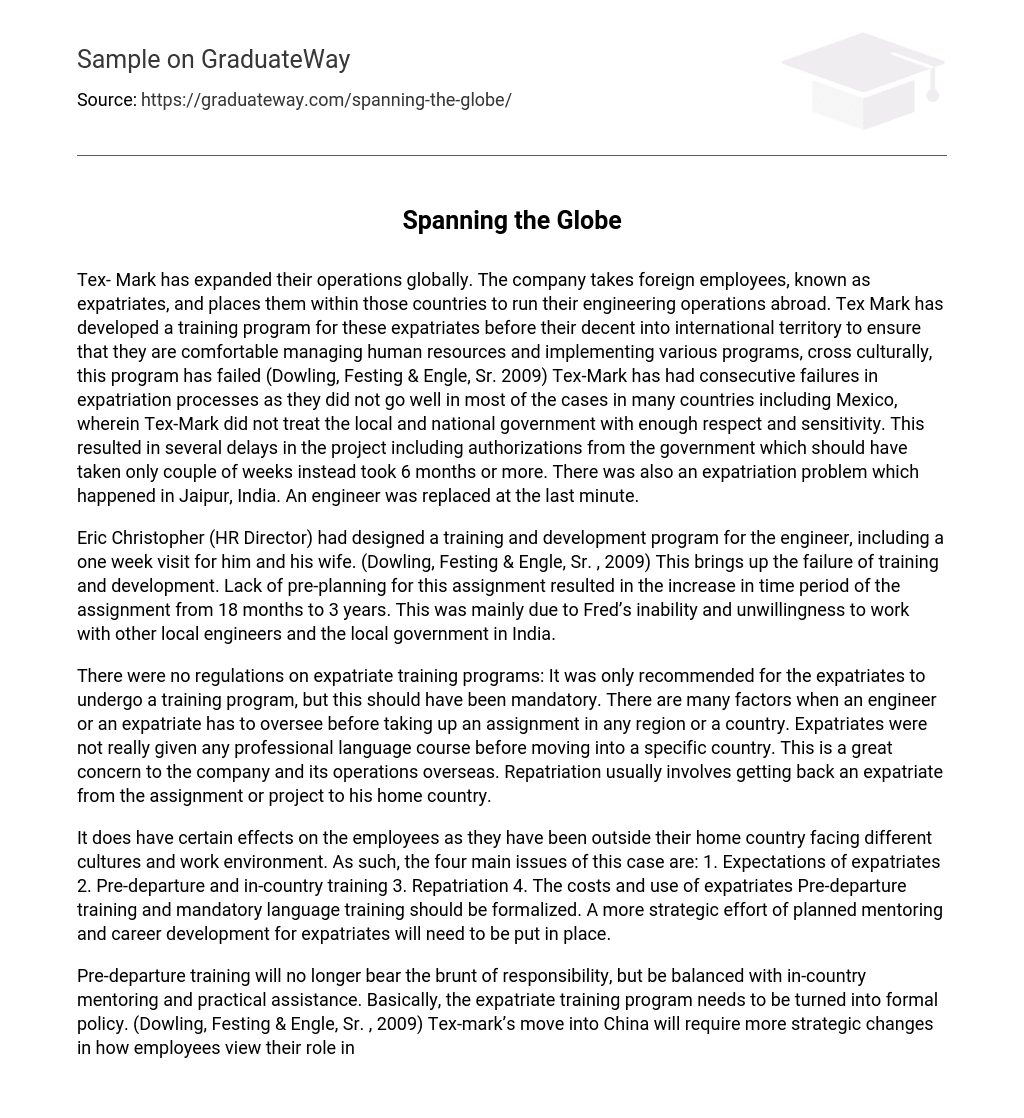Tex- Mark has expanded their operations globally. The company employs expatriates, also known as foreign employees, to manage their engineering operations in different countries. Before sending these expatriates to work internationally, Tex Mark provides them with a training program to ensure that they are comfortable in managing human resources and implementing various programs across different cultures.
However, this program has been unsuccessful (Dowling, Festing & Engle, Sr. 2009). Tex-Mark has faced consecutive failures in their expatriation processes, particularly in countries like Mexico. In these cases, Tex-Mark did not show enough respect and sensitivity towards the local and national government. This lack of consideration resulted in delays in the project, including obtaining authorizations from the government. What should have taken only a couple of weeks ended up taking 6 months or more.
There was also an expatriation issue in Jaipur, India, where an engineer was replaced at the last minute.
Eric Christopher (HR Director) created a training and development program for the engineer, which included a one week visit for him and his wife (Dowling, Festing & Engle, Sr., 2009). This highlights the failure of the training and development initiative. The lack of pre-planning for this assignment led to an extended assignment duration, from 18 months to 3 years. This was primarily caused by Fred’s refusal and incapability to collaborate with other local engineers and the Indian government.
There was a lack of regulations regarding expatriate training programs. It was only suggested that expatriates should participate in a training program, but it should have been mandatory. There are numerous factors that engineers or expatriates must consider before accepting an assignment in any region or country. Expatriates were not provided with any formal language training before relocating to a specific country. This is a significant concern for the company and its international operations. Repatriation typically involves returning an expatriate from their assignment or project to their home country.
The effects on employees who have been working in a foreign country, dealing with diverse cultures and work environments, are significant. The key issues in this case include the expectations of expatriates, pre-departure and in-country training, repatriation, and the costs and utilization of expatriates. It is necessary to formalize pre-departure training and mandatory language training. Additionally, a more strategic approach is needed to provide planned mentoring and career development opportunities for expatriates.
Pre-departure training will no longer take all the responsibility, but will be balanced with in-country mentoring and practical assistance. Essentially, the expatriate training program needs to be formalized as policy (Dowling, Festing & Engle, Sr., 2009). The expansion of Tex-mark into China will require strategic changes in how employees perceive their role in international assignments to avoid similar issues faced by Fred Banks. To cut costs, a host country national (HCN) should be assigned to take charge and lead in China. This would allow Fred to return to the United States as originally promised.
HCNS tend to stay in their roles for longer periods of time, which can lead to improved morale. Providing clear expectations and training and developing HCNs is crucial for long-term success. This will enable the company to have a skilled management team with international experience (Dowling, Festing & Engle, Sr., 2009). As emerging markets and new economies continue to develop, it is also important to train host nationals in information and communication technologies.
The training expenses will be utilized for both the training of expatriates and the mentoring of local employees. This will result in faster and more effective assignments, as locals can take over the responsibilities and reduce costs. Implementing a combination of the polycentric and geocentric staffing approach at Tex-mark and its foreign subsidiaries will lead to improved financial success, increased morale, and enhanced productivity.
Reference: Dowling, P. J., Festing, M., & Engle, Sr., A. (2009). International Human Resource Management. (5th ed., pp. 79-99, 311-314). Mason, OH: South-Western CENGAGE Learning.





